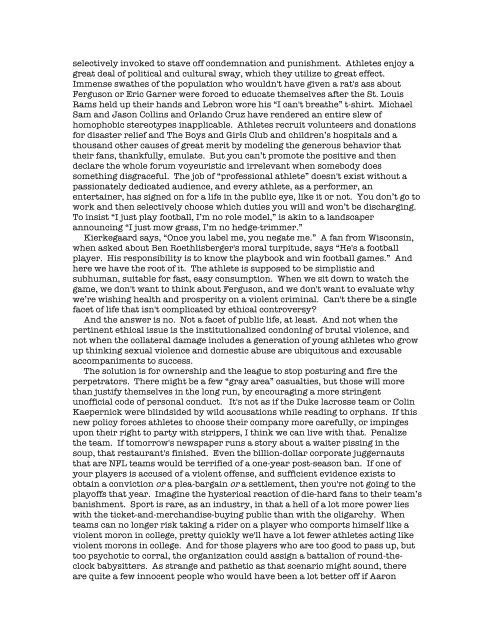StarCat/CatStar
StarCat/CatStar is dedicated to the memory of David Bowie, that cosmic subversive who’s returned at last to his ethereal home.
StarCat/CatStar is dedicated to the memory of David Bowie, that cosmic subversive who’s returned at last to his ethereal home.
You also want an ePaper? Increase the reach of your titles
YUMPU automatically turns print PDFs into web optimized ePapers that Google loves.
selectively invoked to stave off condemnation and punishment. Athletes enjoy a<br />
great deal of political and cultural sway, which they utilize to great effect.<br />
Immense swathes of the population who wouldn't have given a rat's ass about<br />
Ferguson or Eric Garner were forced to educate themselves after the St. Louis<br />
Rams held up their hands and Lebron wore his “I can't breathe” t-shirt. Michael<br />
Sam and Jason Collins and Orlando Cruz have rendered an entire slew of<br />
homophobic stereotypes inapplicable. Athletes recruit volunteers and donations<br />
for disaster relief and The Boys and Girls Club and children’s hospitals and a<br />
thousand other causes of great merit by modeling the generous behavior that<br />
their fans, thankfully, emulate. But you can’t promote the positive and then<br />
declare the whole forum voyeuristic and irrelevant when somebody does<br />
something disgraceful. The job of “professional athlete” doesn't exist without a<br />
passionately dedicated audience, and every athlete, as a performer, an<br />
entertainer, has signed on for a life in the public eye, like it or not. You don’t go to<br />
work and then selectively choose which duties you will and won’t be discharging.<br />
To insist “I just play football, I’m no role model,” is akin to a landscaper<br />
announcing “I just mow grass, I’m no hedge-trimmer.”<br />
Kierkegaard says, “Once you label me, you negate me.” A fan from Wisconsin,<br />
when asked about Ben Roethlisberger's moral turpitude, says “He's a football<br />
player. His responsibility is to know the playbook and win football games.” And<br />
here we have the root of it. The athlete is supposed to be simplistic and<br />
subhuman, suitable for fast, easy consumption. When we sit down to watch the<br />
game, we don't want to think about Ferguson, and we don't want to evaluate why<br />
we’re wishing health and prosperity on a violent criminal. Can't there be a single<br />
facet of life that isn't complicated by ethical controversy?<br />
And the answer is no. Not a facet of public life, at least. And not when the<br />
pertinent ethical issue is the institutionalized condoning of brutal violence, and<br />
not when the collateral damage includes a generation of young athletes who grow<br />
up thinking sexual violence and domestic abuse are ubiquitous and excusable<br />
accompaniments to success.<br />
The solution is for ownership and the league to stop posturing and fire the<br />
perpetrators. There might be a few “gray area” casualties, but those will more<br />
than justify themselves in the long run, by encouraging a more stringent<br />
unofficial code of personal conduct. It's not as if the Duke lacrosse team or Colin<br />
Kaepernick were blindsided by wild accusations while reading to orphans. If this<br />
new policy forces athletes to choose their company more carefully, or impinges<br />
upon their right to party with strippers, I think we can live with that. Penalize<br />
the team. If tomorrow's newspaper runs a story about a waiter pissing in the<br />
soup, that restaurant's finished. Even the billion-dollar corporate juggernauts<br />
that are NFL teams would be terrified of a one-year post-season ban. If one of<br />
your players is accused of a violent offense, and sufficient evidence exists to<br />
obtain a conviction or a plea-bargain or a settlement, then you're not going to the<br />
playoffs that year. Imagine the hysterical reaction of die-hard fans to their team’s<br />
banishment. Sport is rare, as an industry, in that a hell of a lot more power lies<br />
with the ticket-and-merchandise-buying public than with the oligarchy. When<br />
teams can no longer risk taking a rider on a player who comports himself like a<br />
violent moron in college, pretty quickly we'll have a lot fewer athletes acting like<br />
violent morons in college. And for those players who are too good to pass up, but<br />
too psychotic to corral, the organization could assign a battalion of round-theclock<br />
babysitters. As strange and pathetic as that scenario might sound, there<br />
are quite a few innocent people who would have been a lot better off if Aaron














